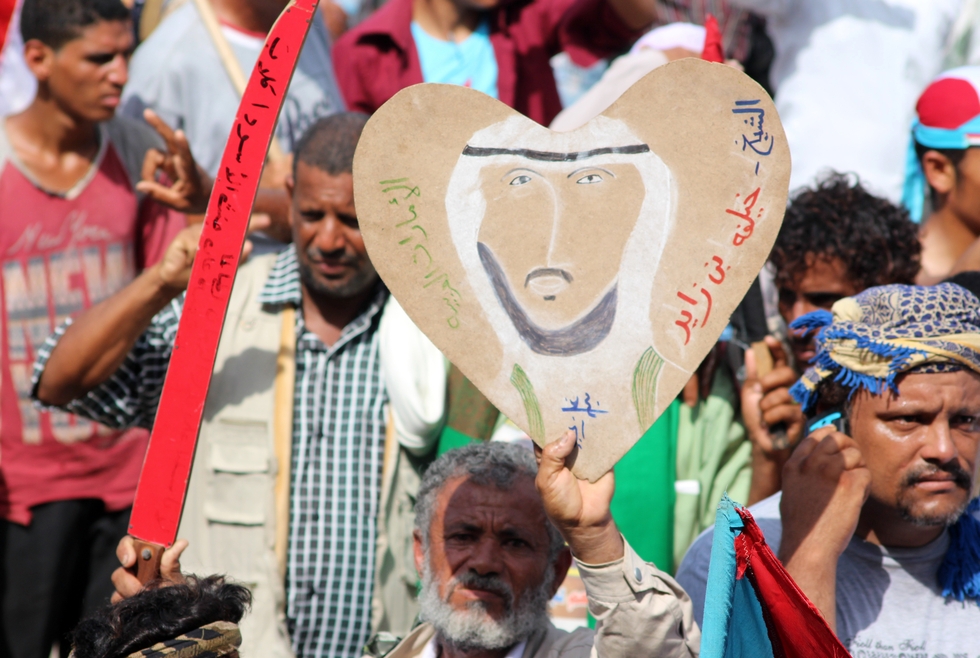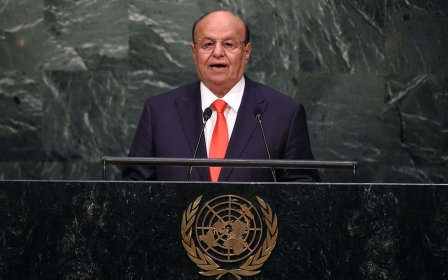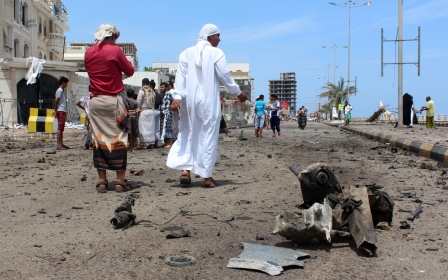Hadi loses control of Aden security as separatists stamp their authority

TAIZ, Yemen - It was mid-afternoon when a group of soldiers came to take Natheer Ahmed al-Masah while he was working on a house in Aden's Khour Makser district on Saturday. The building labourer was dragged to a truck after they found he was originally from Taiz.
Seven labourers were working with the 36-year-old at the time - three were from Taiz, in Yemen's north, but Masah was targeted for not having a sponsor from Aden, in the south of the country.
"I appealed to the soldiers to let me go to my room in Aden and take my belongings, but they refused and told me that Aden does not need me and I should return to Taiz to fight the Houthis," he told Middle East Eye.
More than 20 northerners were on the same truck that brought Masah and his friends to the army's Fourth Brigade barracks, where they were held by the security forces. From there, they were taken to Toor al-Baha area bordering Taiz province.
"After the security forces brought us to Toor al-Baha, we were forced to return to our homes; I had 1,000 riyals in my pocket ($4), while I need 4,000 ($16) to get to my house, so I had to walk around 20km with some others."
New MEE newsletter: Jerusalem Dispatch
Sign up to get the latest insights and analysis on Israel-Palestine, alongside Turkey Unpacked and other MEE newsletters
Masah is now with his family in Taiz's al-Shimayateen district and is looking for a southern guarantor to return to Aden and find work.
He is one of 800 northern Yemenis pushed out of Aden, the former capital of South Yemen, in the last few days. The campaign is against the wishes of president-in-exile Abd Rabbuh Mansour Hadi, but he could do nothing to stop them.
Hadi who?
Aden security sources told MEE that the expulsions were part of a plan to eliminate "suspicious people" who do not have guarantors in the province.
He stated the governor and the police chief of Aden decide what happens in their city.
"We do not care about the decisions of Hadi or the prime minister, Ahmed Bin Dagher, we only go after the directions of the governor and the police chief who know Aden's interests very well."
The source added: "Hadi has already brought the Houthis to Aden, and then brought al-Qaeda, so we are not stupid to trust him anymore."
Hadi appointed the governor of Aden, Aidarous al-Zabidi, and the police, chief Shallal Shaei, but they are originally members of the Southern Movement that demands independence.
As a consequence, the Southern Movement now calls the shots in Aden.
Yemen had for decades been run as two countries until unification in 1990 - South and North Yemen. Its unification in that year is still resented by many in the south, who have fought several civil wars with the north.
The rise to power of Southern Movement leaders during the ongoing civil war has strengthened calls for a return to independence.
UAE, the top dog in Aden
The Fourth Brigade's Aden barracks is also home to forces from the United Arab Emirates, which under a Saudi-led coalition are fighting the Houthi movement and al-Qaeda to ostensibly reinstate Hadi in Yemen.
They have done nothing to back the president and prevent the expulsion of the northerners, however.
Mohammed al-Hassani, a political analyst and the former managing editor of al-Tagheer, said Aden's governors listened to the Emirati forces and no one else.
"The leadership of Aden listens to the Emirati forces and ignores Hadi. The Emirates helped the rehabilitation of Aden and train the security forces," he said.
The security source confirmed the role of the Emirates in Aden, and that governors trusted the Emiratis more than Hadi.
"The Emirati forces fought shoulder-to-shoulder with the southern resistance and army against the Houthis and still fight against al-Qaeda, and the UAE lost troops in Aden, so we trust them more than Hadi or any other side," the source said.
North-south divide
Many southern residents welcomed the expulsion of northerners from Aden, while the northern people consider the move to be an infringement of their human rights.
Fadhl al-Rabei, a political analyst and the head of Madar Strategic Studies Centre in Aden, said Aden residents viewed the expulsions as a step towards an independent south.
"I condemn the expulsion of the northern people from Aden, as this is against their human rights, but there has to be an urgent solution to the southern issue before something worse happens," he said.
He stated the Southern Movement had demanded independence since its creation in 2007 by officers who had been forcibly retired from the army.
The southern issue was discussed at the National Dialogue Conference, a transitional body set up to try to end the civil war in Yemen. It recommended a loose structure of six regions - but the Houthis refused.
Rabei added: "The independence of the south is a question of time, so I appeal the Southern Resistance and the security forces to be patient and follow polite steps to regain their country."
Middle East Eye delivers independent and unrivalled coverage and analysis of the Middle East, North Africa and beyond. To learn more about republishing this content and the associated fees, please fill out this form. More about MEE can be found here.




